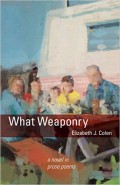
Book Review: What Weaponry by Elizabeth J. Colen

What Weaponry
A novel in prose poems by Elizabeth J. Colen
Black Lawrence Press, August 2016
ISBN-13: 978-1625579577
$15.95; 82 pp.
Reviewed by Emily Hoover
The first piece in Elizabeth J. Colen’s What Weaponry, a novel in prose poems, is titled “Low Clouds,” both for the wet Washington climate that houses the book and the tension that constantly hangs in the air like humidity. The poem opens with the lines: “We build a place to be safe, start talking in circles and building that way.” Colen delivers her protagonist’s desire—safety—and establishes a rocky relationship in less than twenty words. A few lines later, after describing the setting and introducing the couple’s dog, the speaker continues: “We lay in what we have made, minute fleshy bullets in the target we have made. When we see it from above we will know the sea is near, as is the grey, as is the end.” Anxiety, guilt, and fear disrupt the picturesque scene of a family moving, uncovering the speaker’s dull pain and launching the reader into a linear tale of apprehensive beginnings and heart wrenching endings devoid of a “backward kiss goodbye.”
The whole book is like that: raw. Colen’s bold phrasings and her twisted play on words sting, offering little comfort to readers. In three parts consisting of sixty-six prose poems, Colen tells the story of a man relocating to a small coastal town with his partner after his parents have died—“mother and father mixed together in one raw torrent of dust”—only to face a less than warm welcome from heteronormative neighbors and passive aggressive postal workers. This coldness slowly spreads to the speaker and his lover, unraveling them and revealing the parts that shape the whole, in turn illuminating the shield we all craft to fight against the weaponry in the world.
Colen’s portrayal of unease, how it resembles claustrophobia and disintegration, is chilling. In “Contamination Anxiety,” the speaker recalls a past sexual experience and says: “My breath held like in mother’s car with the windows rolled up and the chain smoking.” There is nothing more uncomfortable than being stuck in a confined space enveloped by smoke. In “Produce,” the speaker, while at the grocery store, notices “a man walk into the produce aisle, black hair and black boots and a black gaze.” To this exchange of glances between the stone-faced man and his partner, he says, “He lays you down or sits you up. He’s a magician and you’re what he’s sawing in half.” The paranoia surrounding the idea of being exposed and then reduced, objectified, and detained is always viscerally felt.
Because most failed relationships replay in one’s mind like video on loop, especially when the wounds have yet to scab over, Colen tends to memory in an imagistic rather than chronological fashion. In “Duplication,” the speaker likens the black stones found during a beach walk to his partner’s mother’s homemade bread. As they collect the stones, he says: “You fill each pocket, remembering when bread was heavier…a stab is a throb is a heartbeat. We make love that sinks in shallow water, love that floats the deep.” Most readers have experienced drowning in the memories that haunt them. In “Orders of Magnitude,” the speaker remembers his lover’s traumatic childhood, how “it was the neighborhood kids who put pieces of themselves into your hair, it was them who made you bleed.” An image of suffering characterizes the speaker’s lover. Finally, in the penultimate poem, “What the Body Knows,” the heartbroken speaker wishes he could “sit in the front yard and rearrange the apples that have fallen since I left…But there’s the rot, hands sticky, slugs finding home.”
Even though Colen’s novel is not traditionally structured, and readers can only guess at what finally drove this couple apart, What Weaponry is layered with memories, moments, images, and conflicts that any reader would enjoy dissecting. Beyond the what-ifs, the should-haves, and I-miss-yous is the bare heart. And as Colen writes in the last poem, “No One Waits in the Side Yard:” “There is no mystery here.”
Emily Hoover is a fiction writer and book reviewer based in Las Vegas. Her work has appeared in FIVE2ONE Magazine, Flash Fiction Magazine, Southern Literary Review, Fiction Writers Review, Ploughshares blog and others.

Thanks for sharing for this info, it may be useful for a person to use
it to writing some article, for example. I especially wish to notice your capacity to express
information in an accessible manner. As a popular-science blogger,
then I want to be sure of every part of the writing to meet inquiring
minds with quality information and keep their interest
until the end of the report. You made me see it until the end